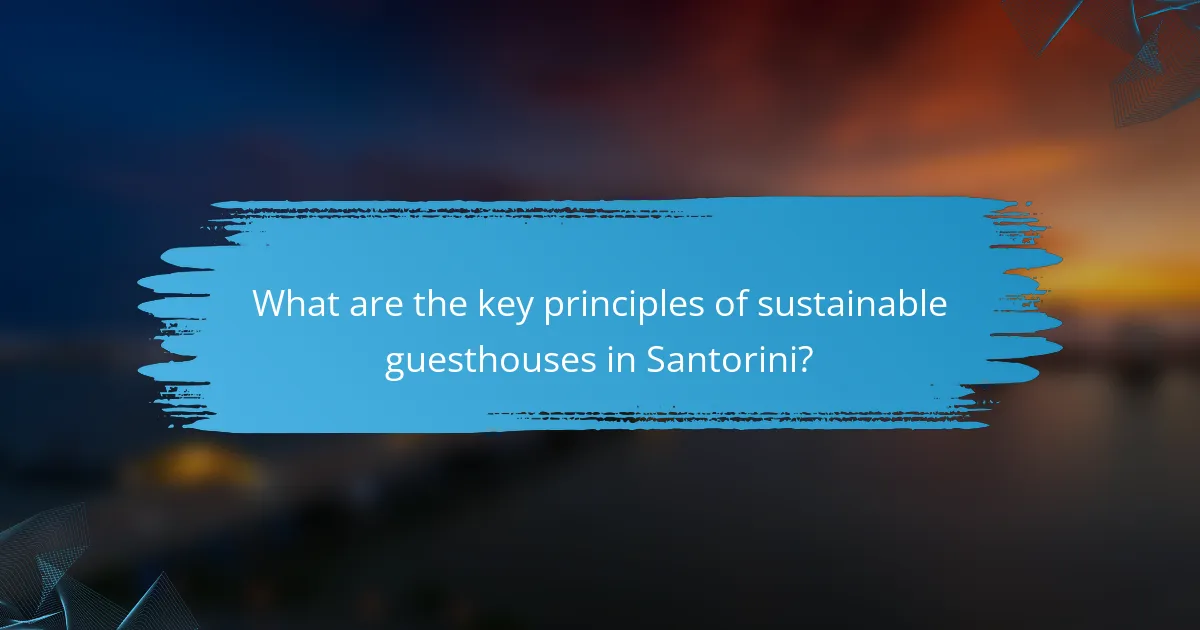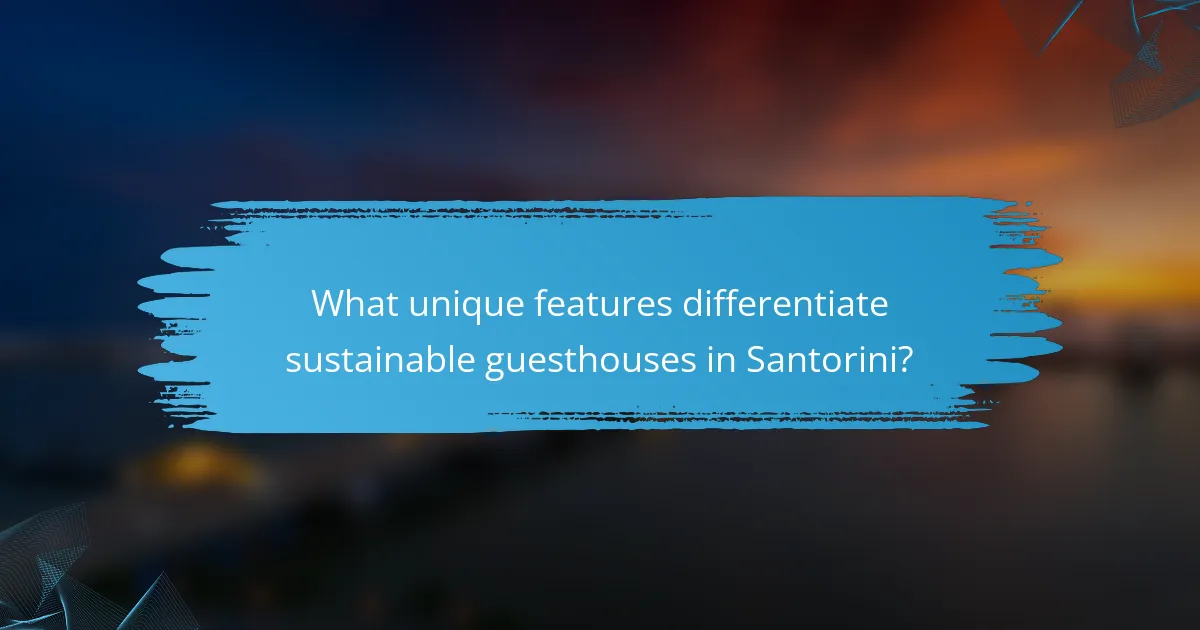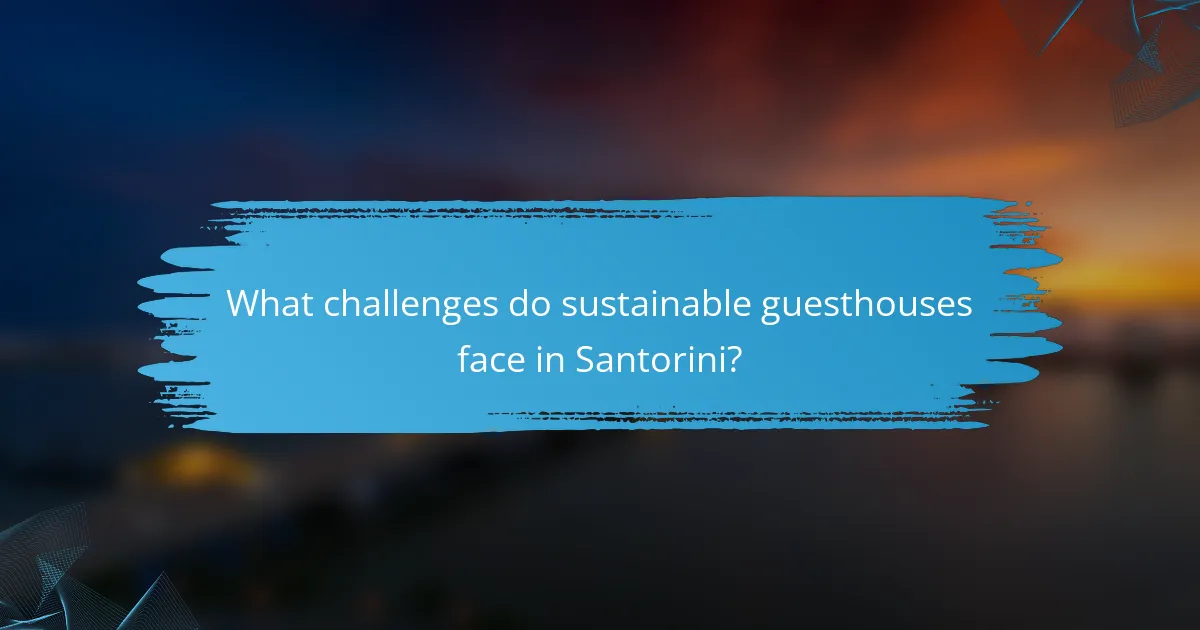Sustainable guesthouses in Santorini offer travelers a unique opportunity to engage with local culture while minimizing environmental impact. These accommodations emphasize community collaboration, innovative eco-design, and the preservation of cultural heritage. By supporting local artisans and utilizing sustainable materials, they create authentic experiences that respect the island’s traditions. This approach not only enhances guest satisfaction but also fosters local economic growth and environmental stewardship.

What are the key principles of sustainable guesthouses in Santorini?
Sustainable guesthouses in Santorini emphasize community engagement, eco-design, and cultural heritage. These principles foster local economic growth, minimize environmental impact, and preserve the island’s unique traditions.
Community engagement involves collaborating with local artisans and businesses, ensuring that tourism benefits residents. Eco-design focuses on using sustainable materials and energy-efficient practices, reducing carbon footprints. Cultural heritage preservation highlights the importance of maintaining traditional architecture and local customs, enriching guest experiences while respecting the island’s history.
These key principles create a harmonious balance between tourism and sustainability, enhancing both visitor satisfaction and community well-being.
How do eco-design practices enhance sustainability?
Eco-design practices enhance sustainability by integrating environmental considerations into the design process. These practices promote resource efficiency, reduce waste, and foster community engagement. For instance, sustainable guesthouses in Santorini utilize local materials, which minimizes transportation emissions and supports local economies. This approach not only preserves cultural heritage but also encourages tourists to appreciate and engage with the local community. Additionally, eco-design can lead to innovative solutions, such as energy-efficient systems, further contributing to sustainability goals.
Why is community engagement vital for local guesthouses?
Community engagement is vital for local guesthouses as it fosters relationships and enhances guest experiences. Engaging with the community allows guesthouses to support local economies and preserve cultural heritage. This involvement can lead to unique offerings, such as local tours or culinary experiences, which attract eco-conscious travelers. Additionally, guesthouses that prioritize community engagement often receive positive feedback, resulting in increased loyalty and repeat visits. By integrating local culture and sustainable practices, guesthouses can create a distinctive identity that resonates with visitors.

What are the benefits of eco-friendly accommodations for guests?
Eco-friendly accommodations offer numerous benefits for guests, enhancing their overall experience. Sustainable guesthouses in Santorini foster community engagement, allowing guests to connect with local culture and support local businesses. Eco-design features, such as natural materials and energy-efficient systems, create a healthier environment for guests. Additionally, these accommodations often preserve cultural heritage, providing guests with authentic experiences that reflect the island’s traditions. By choosing eco-friendly options, guests contribute to environmental conservation, making their stay more meaningful.
How does sustainability impact guest experience?
Sustainability enhances guest experience by fostering a deeper connection to the environment and local culture. Sustainable guesthouses in Santorini prioritize eco-design, which minimizes environmental impact while offering unique accommodations. Community engagement initiatives allow guests to participate in local traditions, enriching their stay. Furthermore, these guesthouses often showcase cultural heritage, providing authentic experiences that resonate with visitors. This holistic approach not only attracts eco-conscious travelers but also supports the local economy, creating a positive feedback loop for both guests and the community.
Which eco-friendly amenities are most popular among travelers?
Eco-friendly amenities that travelers prefer include solar energy systems, organic toiletries, locally sourced food, water-saving fixtures, and recycling programs. These features enhance sustainability while promoting community engagement and cultural heritage in sustainable guesthouses. Travelers increasingly seek accommodations that reflect their values, making these amenities essential.

How do sustainable guesthouses preserve cultural heritage?
Sustainable guesthouses in Santorini preserve cultural heritage by engaging local communities and incorporating traditional design elements. They promote local craftsmanship, support cultural events, and educate visitors about local customs. This approach fosters a sense of identity and pride among residents, ensuring that cultural practices are maintained. Additionally, eco-design methods minimize environmental impact, aligning with the values of both the community and visitors. By prioritizing sustainability, these guesthouses create a model that respects and enhances the unique cultural landscape of Santorini.
What role do local traditions play in guesthouse design?
Local traditions significantly influence guesthouse design in Santorini by integrating cultural heritage into architectural styles and materials. This approach fosters community engagement and promotes sustainability. Traditional elements, such as local stone and whitewashed facades, enhance aesthetic appeal while reflecting the island’s history. Incorporating local craftsmanship in furnishings and decor creates a unique guest experience that honors the community’s identity.
How can guesthouses promote local artisans and crafts?
Guesthouses can promote local artisans and crafts by showcasing their work and providing a platform for sales. They can host workshops that engage guests with traditional crafts and offer curated products in their common areas. Collaborating with artisans for unique decor enhances the guest experience while supporting the local economy. This engagement fosters cultural heritage and creates a sustainable tourism model that benefits both guests and the community.

What unique features differentiate sustainable guesthouses in Santorini?
Sustainable guesthouses in Santorini stand out due to their commitment to community engagement, innovative eco-design, and preservation of cultural heritage. These guesthouses often collaborate with local artisans, ensuring that their operations benefit the surrounding community. Eco-design features include the use of renewable materials and energy-efficient systems, which minimize environmental impact. Additionally, many guesthouses incorporate local traditions and architecture, enriching the guest experience while promoting cultural heritage.
Which architectural styles are commonly used in eco-design?
Common architectural styles in eco-design include bioclimatic, vernacular, and modern sustainable designs. These styles prioritize energy efficiency, local materials, and minimal environmental impact. Bioclimatic architecture utilizes natural climate conditions for heating and cooling. Vernacular architecture reflects local culture and traditions, often incorporating sustainable practices. Modern sustainable designs focus on innovative technologies and materials to enhance sustainability.
How do guesthouses incorporate renewable energy solutions?
Guesthouses in Santorini incorporate renewable energy solutions primarily through solar panels and energy-efficient designs. Many establishments utilize photovoltaic systems to harness sunlight, significantly reducing electricity costs. Additionally, some guesthouses implement geothermal heating, leveraging the island’s natural resources for efficient temperature control. These practices not only lower carbon footprints but also enhance guest experiences by promoting sustainability. Engaging with local communities, these guesthouses often source materials and labor locally, further supporting eco-friendly initiatives.

What challenges do sustainable guesthouses face in Santorini?
Sustainable guesthouses in Santorini face challenges like high operational costs, limited local resources, and the need for community engagement. They often struggle with integrating eco-design while preserving cultural heritage. Additionally, attracting eco-conscious tourists requires effective marketing strategies. Balancing sustainability with profitability remains a significant hurdle.
How can guesthouses overcome financial barriers to sustainability?
Sustainable guesthouses can overcome financial barriers by implementing community engagement strategies, eco-design practices, and leveraging cultural heritage. These approaches enhance operational efficiency and attract eco-conscious travelers.
Community engagement fosters local partnerships, reducing costs through shared resources and increasing customer loyalty. Eco-design minimizes resource consumption while maximizing guest experience, leading to long-term savings. Cultural heritage initiatives create unique offerings that differentiate guesthouses in a competitive market.
As a result, these strategies not only promote sustainability but also improve financial viability, allowing guesthouses to thrive in Santorini’s tourism landscape.
What regulatory hurdles affect eco-friendly accommodations?
Regulatory hurdles for eco-friendly accommodations in Santorini include strict building codes, environmental impact assessments, and zoning laws. These regulations can limit design options and operational flexibility for sustainable guesthouses. Compliance with local heritage preservation laws also impacts eco-design initiatives. Community engagement is essential to navigate these challenges effectively.

How can travelers identify truly sustainable guesthouses?
Travelers can identify truly sustainable guesthouses by evaluating their community engagement, eco-design practices, and preservation of cultural heritage. Look for guesthouses that actively involve local residents in decision-making and offer authentic cultural experiences. Check for eco-friendly design elements, such as solar panels and sustainable materials. Additionally, assess their commitment to preserving local traditions and supporting artisans. This holistic approach ensures that your stay contributes positively to the environment and community.
What certifications should guests look for?
Guests should look for certifications like Green Key, EarthCheck, and Travelife when selecting sustainable guesthouses in Santorini. These certifications indicate a commitment to eco-design, community engagement, and cultural heritage preservation. Green Key focuses on environmental management, while EarthCheck provides benchmarks for sustainability practices. Travelife emphasizes social responsibility and environmental stewardship. Choosing certified guesthouses ensures support for responsible tourism and local communities.
How can reviews and ratings indicate sustainability practices?
Reviews and ratings significantly indicate sustainability practices in guesthouses. High ratings often reflect eco-friendly initiatives and community involvement. Sustainable guesthouses in Santorini engage with local culture and prioritize eco-design, enhancing their appeal. Positive guest feedback highlights these attributes, showcasing commitment to sustainability and cultural heritage.

What are best practices for operating a sustainable guesthouse?
To operate a sustainable guesthouse, prioritize eco-friendly practices, community involvement, and cultural preservation. Implement energy-efficient systems, utilize local materials, and support local artisans. Engage guests in cultural experiences and educate them about sustainability. Foster partnerships with local businesses to enhance community ties and promote responsible tourism.
How can guesthouses effectively engage with the local community?
Sustainable guesthouses in Santorini can engage effectively with the local community by fostering partnerships, promoting local culture, and supporting environmental initiatives. They can collaborate with local artisans for workshops, offer tours that highlight cultural heritage, and source food from nearby farms. These actions create a sense of belonging and mutual benefit. Engaging in eco-friendly practices, such as waste reduction and energy conservation, aligns guesthouses with community values and enhances their reputation. By hosting community events, guesthouses can strengthen ties and encourage local participation, enriching both guest experiences and community well-being.
What strategies can improve environmental impact while maintaining guest satisfaction?
Implementing sustainable practices enhances environmental impact while ensuring guest satisfaction. Strategies include community engagement, eco-design, and preservation of cultural heritage.
Community engagement fosters local partnerships, promoting responsible tourism and authentic experiences. This enhances guest satisfaction through meaningful interactions.
Eco-design incorporates renewable materials and energy-efficient systems, reducing ecological footprints. This approach creates comfortable environments, appealing to eco-conscious travelers.
Preserving cultural heritage enriches the guest experience. By showcasing local traditions and craftsmanship, guesthouses can offer unique stays that resonate with visitors.